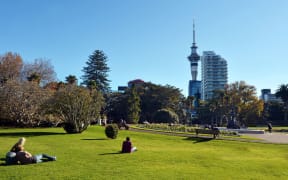A prominent Auckland councillor is demanding police do more in downtown Auckland to make it safer for students.
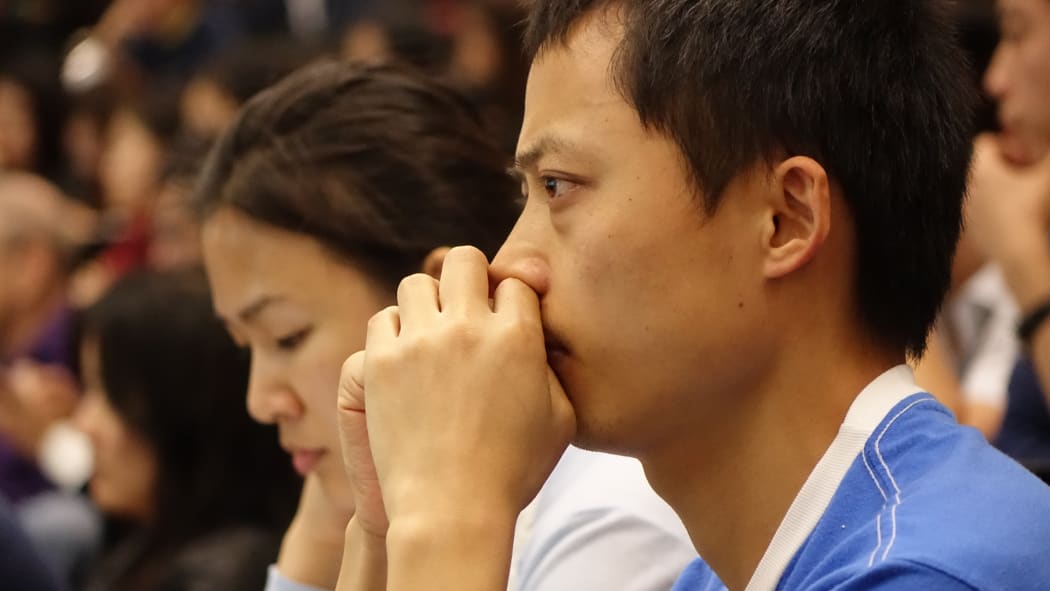
Students listen to speakers at a meeting about safety in the city last night. Photo: RNZ / Kim Baker Wilson
Waitemata and Gulf ward councillor Mike Lee told a meeting organised by Chinese students last night the city is not safe - putting him at direct odds with the police.
Hundreds of people attended the meeting at the University of Auckland, which was prompted in response to a number of recent violent attacks on international students.
The New Zealand Chinese Students' Association called for better lighting and security camera coverage in Albert Park.
The association made a plea that foreign students be given someone to turn to if they were attacked, using police resources, Education New Zealand, and tertiary institutions.
It has also started an online petition demanding better security in the park.
Mr Lee, whose ward includes central and inner Auckland, said there was conflicting information over the safety of the city.
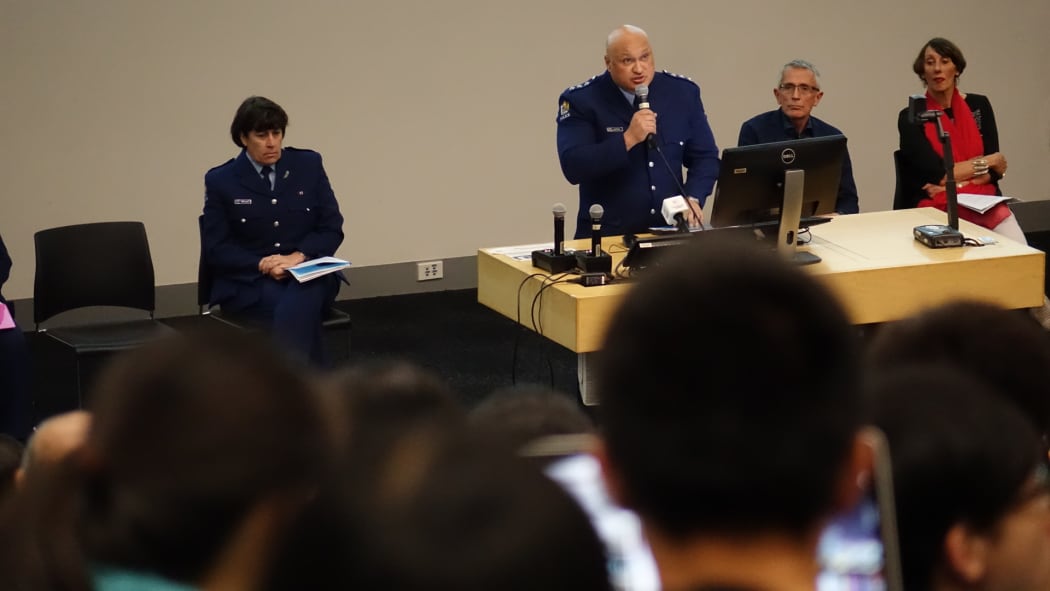
Inspector Joe Tipene from the police Maori, Pacific and Ethnic Services addressing the meeting. Photo: RNZ / Kim Baker Wilson
"There's two messages coming out - that Auckland is incredibly safe 'but don't go there, don't go there, don't carry this and don't carry that'."
"Auckland is not incredibly safe ... it's not safe at all, it needs to be safe and it can be safe, and together we will make it safe.
"But the people who must lead this are the New Zealand Police ... the gangs of violent offenders who frequent the city centre ... need to be cleaned up once and for all," he said.
Mr Lee said this meant he wanted a permanent solution and "not just a few arrests", and added he had formally complained to the mayor about the level of violence.
The police said everything was being done to make sure people were safe, but admitted there were gaps in CCTV camera coverage and they wanted more than the 700 currently installed.
Inspector Joe Tipene from the police Maori, Pacific and Ethnic Services said Auckland had issues around opportunist criminal behaviour "like all major international cities".
"We want to reassure everyone here this evening that we are doing all that we can to ensure that the public is safe and feels safe in this great city."
Mr Tipene said police in Auckland had the most advanced district command centre in the country, and that it was the first district to monitor cameras 24 hours a day.
"We are also in discussion with a number of business associations with a view to utilising their camera networks in various parts of the city," he said.
But Unitec chief executive Rick Ede said the educator had put permanent security at the Oakley Creek walkway where one student had been attacked, even though it was a council walkway across a council reserve.
"We have that now covered from 8am to 10pm seven days a week because not only do our students use that walkway, members of the community do as well.
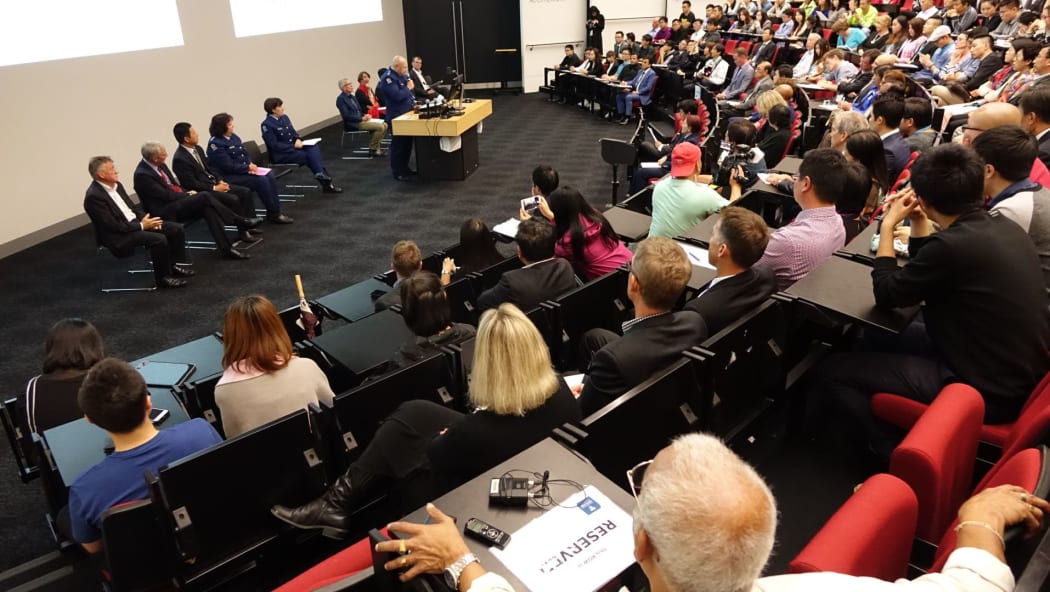
Hundreds attended the Auckland meeting. Photo: RNZ / Kim Baker Wilson
"We want to play our part in helping to keep all members of the community safe," he said.
AUT said it had increased security at its campus after the attacks.
Call for more police resources
Labour MP and Auckland mayoral candidate Phil Goff told the meeting he was appalled and ashamed by the attacks on foreign students.
"Each of those attacks were quite brutal attacks, this wasn't just a bag snatch or a theft, this was gratuitous violence - punching and kicking people on the ground, leaving the victims bruised and bleeding.
Mr Goff called for the police to be better resourced and for the public to be given "a certainty of apprehension".
"The police aren't getting the resources ... so we need to be sure that our police force is in a position to respond when we need them."
But Auckland Central MP Nikki Kaye said the city had more police than ever.
She said there may be areas in Auckland where more work was needed, but didn't believe it was a case of major resourcing issues.
"I think this is more about where we put resources - things like lighting and things like cameras can be massive detterants.
"So I think it's more complex than that and it's a bit unfortunate Mr Goff has made those comments - he should look at the numbers."
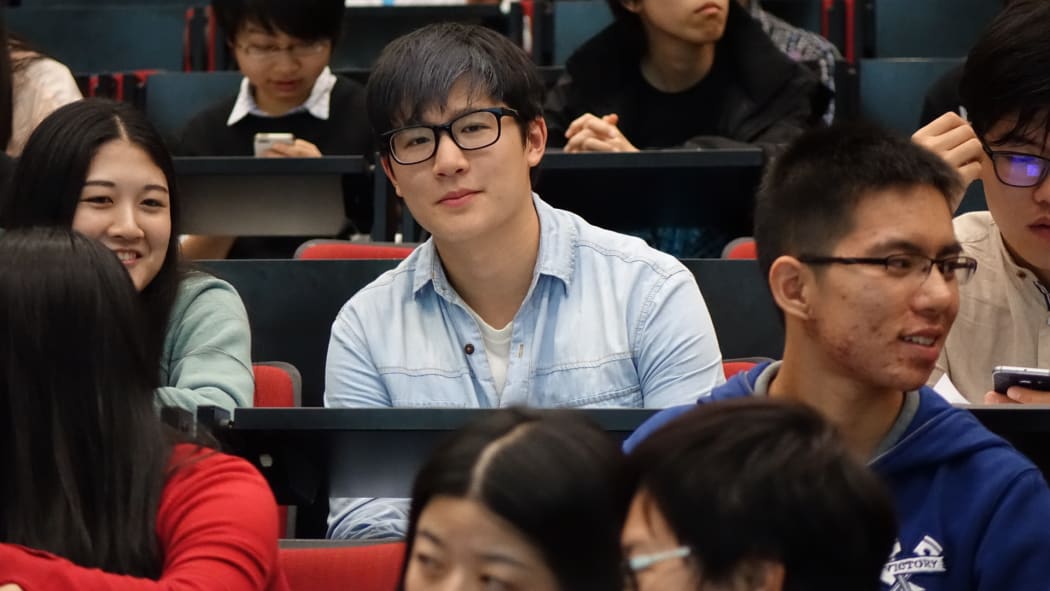
Students expressed their concerns at the meeting in the city last night. Photo: RNZ / Kim Baker Wilson
Chinese Consulate-General wants a solution
China's Vice Consul-General Binhui Luo said the attacks had been distressing.
"We all know that several violent assaults and robberies against Asians took place in Auckland ... among the victims were three Chinese students.
"In my view strengthening communication and working for a solution should be what we endeavour... today's meeting is a right step," he said.
John Goulter from Education New Zealand, the government agency which markets the country as an education destination, said the organisation was appalled by the attacks.
"New Zealand prides itself on being a safe, welcoming, multi-cultural country ... when these terrible things happen I think all New Zealanders are appalled.
The Auckland University Students' Association has started a Facebook event to "reclaim" Albert Park near the university.

